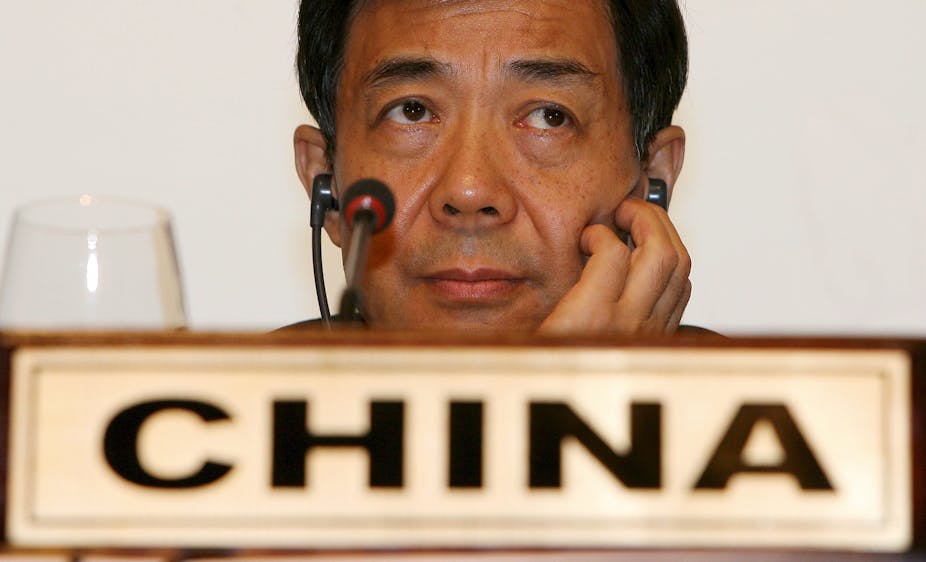China’s new leaders are aware of the danger that corruption poses to the nation’s social stability and economic development.
But entrenched corruption at the local and national levels, including among the families and friends of those very leaders, will make it difficult for them to break the link between money and power that frustrates the masses but sustains the power of a Communist Party that long ago abandoned political belief for economic gain.
A 2007 report of the Carnegie Endowment for International Peace by Minxin Pei called the level of Chinese corruption “astonishing,” noting that it cost $US86 billion a year, more than China’s annual education budget. Things have not gotten any better. The Bo Xilai affair – Bo’s wiretapping of other top Chinese leaders, his son’s privileged lifestyle abroad, and his wife’s murder conviction – was but the most lurid case of rampant corruption that has shaken the trust of the Chinese people in their government.
Other high-profile cases have left the public seething: the melamine-laced milk that poisoned hundreds of infants; the Wenchuan earthquake that toppled “tofu schoolhouses” onto pupils while government buildings stood firm; the bullet train crash in Wenzhou that disgraced railway czar Liu Zhijun; and the sale by Wukan officials of prized farmland to real estate developers that triggered villager demonstrations and violence.
In his speech to the 18th Party Congress last week, outgoing President Hu Jintao stressed the need to fight corruption, warning that if the issue is not addressed, “it could prove fatal to the party, and even cause the collapse of the party and the fall of the state.” Significantly, he warned leading officials to “strengthen education and discipline over their family and staff.” Along the same lines, incoming Party general secretary Xi Jinping in 2004 instructed, “Rein in your spouses, children, relatives, friends and staff, and vow not to use power for personal gain.”
But Chinese leaders have made similar warnings for years without making serious headway. That’s because of what Kenneth Lieberthal of the Brookings Institution terms the “marriage of wealth and political power” which supports an economic strategy based on rewards to local officials for “producing rapid GDP growth while keeping a lid on social unrest.” Put another way, the breakneck speed of Chinese economic development provides wealth that is distributed as patronage and provides support for the Party’s continued political monopoly. And campaigns against corruption evoke the Chinese proverb, “Loud thunder, little rain.”
More specifically, Minxin Pei cites two characteristics of corruption – the corruption of local state institutions through the purchase and sale of government appointments, and “collusion among local ruling elites” or “groups of local officials who cooperate and protect each other.” These practices drain the economy and feed public cynicism but they nurture the political and economic ambitions of entrepreneurs and government officials who thrive in a poorly defined regulatory and policy environment.
This is the social context in which Chinese leaders and their families operate, which is why the calls of Hu Jintao and Xi Jinping for discipline of families and staff is so interesting. Politicians, their relatives, staff, and friends use their political clout to build businesses and line their pockets. The average wealth of the richest 70 members of the National People’s Congress in 2011 was over US$1 billion. China’s central bank reportedly has evidence that up to 18,000 officials and employees of state-owned firms have fled China since the mid-1990s, taking $127 billion with them.
And recent reports have shown how relatives of top Chinese officials have grown wealthy. Xi himself reportedly has sisters and brothers-in-law with “huge interests in China’s real estate, minerals and telecommunications sectors.” And the family of Premier Wen Jiabao, perhaps the strongest reform advocate of all China’s top leaders, has been reported by the New York Times to have US$2.7 billion in wealth.
The reality is that Chinese leaders, even those who call for (and may sincerely believe in) reform and a crackdown on corruption, find themselves in a social web of political influence and enrichment that sustains the status quo. That reality will make it just as hard for the new leaders as it was for their predecessors to make a serious tilt at corruption.
Corruption and influence peddling are as old as the Chinese nation, and as old as human history. What is new is the demand of poor farmers, workers, and China’s growing middle class for a level playing field and a fairer chance for opportunity. Growing social tensions and environmental stresses make the current system unsustainable for the long term.
How Ji Xinping and the new Politburo meet that test will determine history’s verdict on whether they are authentic leaders with the courage to take the needed steps for the common good of the Chinese people and the welfare of the Chinese nation.

